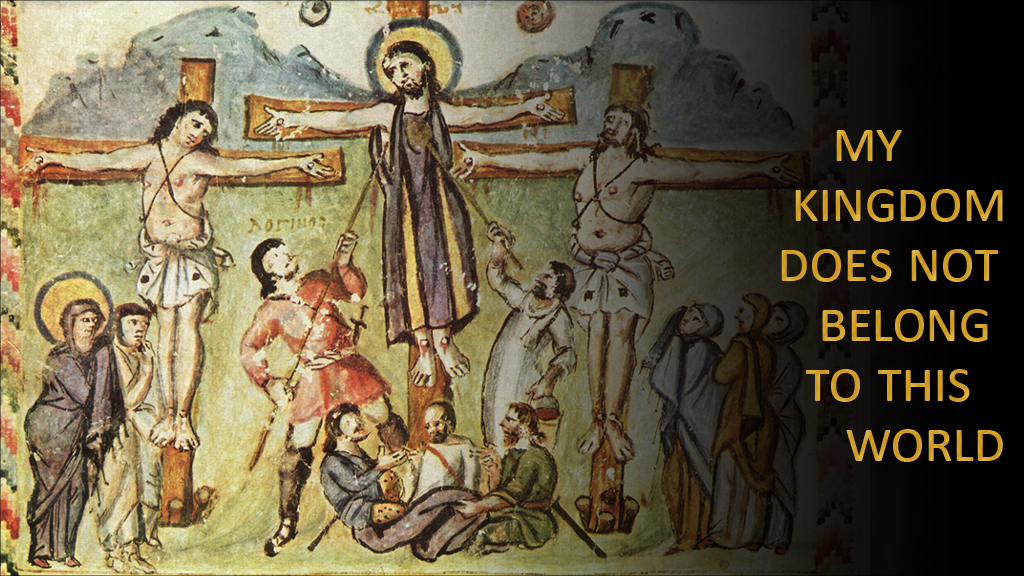Jijo Kandamkulathy, CMF
Claretian Publications, Macau
The Solemnity of Our Lord Jesus Christ, King of the Universe – Year B
Gospel Reflection – Jn 18:33b-37
At the end of the liturgical year, we celebrate the kingship and ultimate victory of Christ. Today, the gospel is from John, where Christ is revealed as king in the middle of Pilate’s interrogation. Jesus explains to Pilate that his Kingdom is not of this world, and Pilate found him no threat to his earthly kingdom. But Pilate, in the accusation written on the cross, named Jesus as the king of the Jews. As Pilate represented the Roman emperor, his writing was equivalent to the emperor of the world accepting Jesus as king despite the Jewish resistance to the royal title.
Parsing this gospel passage gives us a glimpse of how Christ assumes the role of king even in the middle of the interrogation and taught Pilate a thing or two on truth and a kingdom that is not of this world. Jesus would assume the position of the king on the cross and give amnesty to the thief and soldiers, establishing forgiveness as the hallmark of his kingdom. Unfortunately, the suffering and forgiving king on the cross is often blurred, to foreground the ruthless judge.
Kingship appears a little too far-fetched title for Christ, who evaded every attempt of the people to make him a king. Someone is king when there is a kingdom—some subjects to govern and judge. Jesus had none. He was born poor and lived in poor circumstances. Still, he is celebrated as a king. My meditations on Christ’s kingship take me to the collective human psyche that creates stories and narratives of kings and kingdoms. In Greek mythology, there is a story of Prometheus, a son of God. He brought fire (the goodness of the heavens) to share with humans and was mercilessly punished for being compassionate.
In Indian mythology, there is a story of the Gandharva (the Indian version of Cupid), and he must deflower human virgins in secret and return to heaven. Once, a Gandharva falls in love with the virgin he was ordered to deflower and refuses to return to the heavens and receives the punishment for breaking the rules of the heavens.
Christ the king is also a narrative of a king (Son of God), coming down to save humanity and got himself crucified. And for poetic justice, he should come back as a victorious king. We all fall into the trap of the psychological need for weaving a story of victory in moments of our defeat. I cannot imagine a Christ who forgave his torturers from the cross contracting a multiple personality disorder before his second coming and assuming the role of a vengeful king and destroying all his enemies!
Kings were significant in wars. One of the reasons that Israel demanded a king was to lead them in war! The defeated side of war makes a narrative of their own. The victorious ones make another narrative, giving meaning to the psychological experience they are undergoing collectively. The experience of defeat might have unconsciously raised the desire for a king who wins eternally in early Christianity. The solemnity of Christ the King came to prominence when the position of kings was disappearing or was forced to surrender to give way to democratic and other modern forms of government. Many of them were Catholic kings! In later theological musings, we find that Christ is reimagined as a democratic spirit evolving from within humanity as Teilhard de Chardin conceived.
A king rules his kingdom by commandments and rules. The actions of the subjects will be judged based on compliance or non-compliance with these rules. Those who fail to obey are punished to coerce obedience. Those who work against the king are charged with sedition and often put to death. This narrative of the kingdom is pretty well transferred to the kingdom of God and the kingship of Christ. But, very often, these unconscious narratives of kingship that we have about earthly kings do not match with that of Christ.
The kingship of Christ is a symbol today. It represents God’s power to protect the subjects under him and to govern over them. Christ, the eternal king, ensures the ultimate defeat of the enemy that wages war within our hearts. He judges and dispenses justice. The depiction of the king dividing people into categories of good and evil are all part of the judge-role of Christ.
What is essential in celebrating this solemnity is to identify whose laws and decrees are inscribed in one’s heart and what values govern one’s choices and actions. If it is of Christ, he reigns our hearts, and we belong to his world. He has established the rules to belong to his kingdom. The only commandment of his kingdom is to love one another. The statutes of this one commandment are all acts of charity: feeding the hungry and thirsty, clothing the naked and taking care of the needy. The narratives of Christ’s kingship devoid of the laws of charity makes a contentless story to match the unconscious narrative patterns of the human psyche. By undertaking acts of charity collectively and personally, we will be caught in his kingdom unawares!


 Follow
Follow


